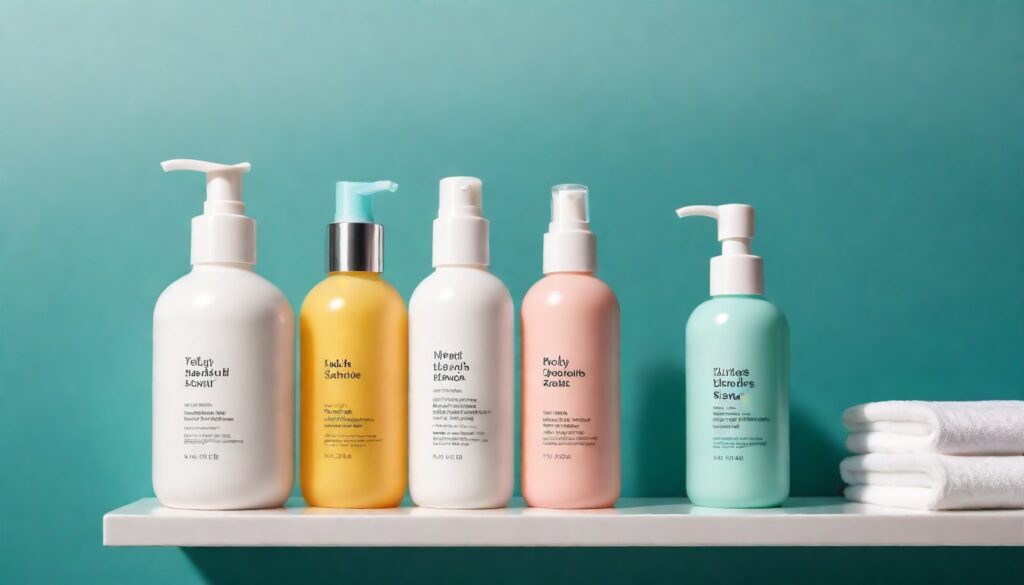Have you ever heard of hypochlorous acid? Hold on, don’t wrinkle your nose just yet! While it sounds a bit intimidating (it is an acid, after all!), hear me out. I recently discovered the magic of hypochlorous acid spray for face and let me tell you, it’s been a game-changer.
There was a time I, uh…let’s just say I got a little overzealous with the retinol and my face looked like a freshly peeled sunburn? Yeah, not a good look. Thankfully, I stumbled upon hypochlorous acid spray in my quest to soothe the irritation and boy, did it ever deliver! It calmed the redness, reduced inflammation, and made my skin feel happy again.
But hypochlorous acid spray for face is good for more than just sunburn woes. Keep reading to find out how this innovative ingredient can benefit your skin!
Table of Contents
So, What Exactly Is Hypochlorous Acid Stuff?
Okay, okay, enough about my sunburn story (although, trust me, it was epic). Let’s delve into the science behind this wonder ingredient – hypochlorous acid (say it five times fast!).
Where Does Hypochlorous Acid Come From?
Believe it or not, your amazing body actually produces its own hypochlorous acid! It’s a molecule created by your white blood cells to fight off bad bacteria and keep you healthy. Pretty cool, right? So, scientists basically took a page out of nature’s playbook and figured out how to create a stabilized version of hypochlorous acid for topical use – like in that hypochlorous acid spray for face I was raving about!
Here’s the science bit: hypochlorous acid is formed when chlorine is dissolved in water. This potent molecule packs a punch when it comes to killing bacteria, viruses, and other nasties that try to wreak havoc on our skin.
How Do They Make This Magic Potion?
There are a few different ways to produce hypochlorous acid, but the most common method involves electrolysis. Think of it like a science experiment in your bathroom (except, you know, leave the actual experimenting to the professionals). By zapping a saltwater solution with electricity, you create hypochlorous acid – a safe and gentle disinfectant that works wonders on your skin.
Hypochlorous Acid Spray: Benefits Beyond Sunburn Woes

Now that we’ve met hypochlorous acid, let’s talk about why it deserves a spot on your skincare shelf. This isn’t just some one-trick pony for sunburn relief (although, major props for that!). Hypochlorous acid spray for face boasts many benefits that can seriously up your skincare game.
Hypochlorous Acid’s Calming Power
Remember how I mentioned my retinol incident? Yeah, my face looked like a stop sign. Thankfully, hypochlorous acid spray for face came to the rescue! Here’s the deal: Hypochlorous acid has amazing anti-inflammatory properties. Think of it like a tiny firefighter putting out the flames of irritation. This means it can soothe redness, calm breakouts, and even help with conditions like eczema and rosacea.
Tip: Keep a travel-sized hypochlorous acid spray in your bag for on-the-go relief from irritation caused by sun exposure, dry weather, or even a face mask (seriously, those things can get scratchy!).
Blast Those Breakouts: Hypochlorous Acid’s Antimicrobial Power
Here’s another amazing quality of hypochlorous acid: it fights acne-causing bacteria! Those annoying pimples and blackheads often stem from an overgrowth of bacteria on the skin. Hypochlorous acid spray can help keep those bacteria in check, leading to clearer, smoother skin.
For extra acne-fighting power, consider using a hypochlorous acid spray in conjunction with your regular acne treatment. Just make sure to check with your dermatologist first to ensure they play nicely together.
Double Duty Hero: Hypochlorous Acid and Hydration
Who knew an ingredient could be so well-rounded? Not only does hypochlorous acid calm and combat breakouts, but it can also help your skin retain moisture. This is because it helps maintain the skin’s natural barrier function, which is key for keeping your skin plump and hydrated.
Sensitive Skin? No Problem!
Worried about harsh chemicals irritating your delicate skin? Hypochlorous acid spray for face is generally very gentle and well-tolerated by even the most sensitive skin types. This is because it has a similar pH level to healthy skin. Win-win!
Hypochlorous Acid Spray for Face: Is It Too Good to Be True?
Okay, so by now you’re probably thinking, “This hypochlorous acid spray for face sounds amazing! Is there a catch?” Well, let’s chat about safety and side effects.
Can Hypochlorous Acid Irritate My Skin?
While generally very gentle, there’s always a chance any new product can cause some minor irritation, especially if you have super sensitive skin. Here’s the thing: When you first start using a hypochlorous acid spray for face, you might experience a slight tingling sensation. This is usually nothing to worry about and should subside quickly. However, if the irritation persists or worsens, stop using the product and consult your dermatologist.
Tip: Before slathering the spray all over your face, apply a small amount to your inner arm and wait 24 hours to see if there’s any reaction.
Debunking the Myth: Is Hypochlorous Acid Basically Bleach?
Here’s a common misconception: hypochlorous acid sounds similar to bleach, so it must be harsh, right? Wrong! While they both contain chlorine, hypochlorous acid (HOCL) is a much gentler molecule compared to sodium hypochlorite (bleach). HOCL is what your white blood cells produce, while bleach, as we all know, is a much stronger disinfectant used for cleaning surfaces.
So, Is Hypochlorous Acid Spray for Face Safe?
Overall, hypochlorous acid spray for face is considered a safe and effective skincare ingredient for most people. However, it’s always best to consult with your dermatologist before introducing any new product to your routine, especially if you have any underlying skin conditions.
Risk Radar: Who’s The Perfect Fit?

Alright, alright, we’ve covered the science, and the benefits, and even addressed some safety concerns. But the big question remains: is hypochlorous acid spray right for YOU? Spoiler alert: there’s a good chance it is! This superstar ingredient caters to a wide range of skin concerns and types.
Skin Concerns? Hypochlorous Acid to the Rescue!
Here’s the beauty of hypochlorous acid spray for face: it’s a multi-tasking marvel. Whether you’re battling pesky breakouts, dealing with redness and irritation, or simply want to maintain healthy, balanced skin, this spray can be a game-changer.
- Acne Prone Skin: The antimicrobial power of hypochlorous acid helps keep acne-causing bacteria in check, leading to clearer skin.
- Sensitive Skin: Worried about harsh chemicals? Hypochlorous acid is generally very gentle and well-tolerated by even the most sensitive skin types.
- Dry or Irritated Skin: Hypochlorous acid’s ability to help maintain the skin’s barrier function can improve hydration and reduce irritation.
- Eczema and Rosacea: The anti-inflammatory properties of hypochlorous acid can help soothe flare-ups and calm redness associated with these conditions.
Struggling with irritated, over-exfoliated skin? My article here offers 6 calming solutions to soothe and repair your skin barrier plus a perfect exfoliation schedule for oily skin types!
Age Ain’t Nothing But a Number
Here’s the best part: hypochlorous acid spray isn’t just for teenagers or those with specific skin concerns. This gentle yet effective ingredient can be a valuable addition to any skincare routine, regardless of your age.
- Teens and Young Adults: Fight acne and soothe irritation caused by hormonal changes.
- Adults: Maintain a healthy skin barrier, reduce redness, and promote overall skin health.
- Mature Skin: Combat dryness and irritation while promoting a more even skin tone.
An All-Star Ingredient
Gone are the days of gendered skincare aisles! Hypochlorous acid spray for face is a versatile ingredient that welcomes everyone to the party. This isn’t just for teenagers or those with specific concerns – it can be a valuable addition to any skincare routine, regardless of age, gender identity, or skin type.
No matter how you identify, hypochlorous acid can be your new skincare BFF. Here’s how it benefits everyone:
- Men: Soothe post-shave irritation or calm breakouts for a comfortable, healthy complexion.
- Women: Incorporate it into your existing routine for a radiant, balanced glow.
- Everyone: Experience the calming, anti-inflammatory properties that help with various skin concerns.
Hypochlorous acid is a truly inclusive ingredient that offers a multitude of benefits for all ages and genders. Just remember to consult your dermatologist before adding anything new to your routine, so you can use it without any second thoughts!
How Do You Use Hypochlorous Acid?
Alright, so you’re sold on the amazingness of hypochlorous acid spray for face (and rightfully so!). But now you might be wondering, “how exactly do I use this stuff?” Don’t worry, it’s super easy to incorporate this skincare superhero into your routine. Here’s a step-by-step guide and some handy tips to maximize its benefits.
The Easy A-B-Cs of Application
Using a hypochlorous acid spray for face is as simple as 1, 2, 3 (well, 4, but who’s counting?):
- Cleanse your face: Start with a clean, dry base. Wash your face with your usual cleanser to remove any dirt, makeup, or oil.
- Shake, Shake, Shake: Give your hypochlorous acid spray a good shake to ensure all the good stuff is mixed up.
- Spray It Up!: Hold the bottle at arm’s length and mist your face 2-3 times, making sure to get all areas (don’t forget your neck!).
- Let It Breathe: Allow the spray to air dry completely before applying any other skincare products.
Feeling lost in the cleanser aisle? This two-part guide is your key to clearer, happier skin! We unveil the secrets of oil cleansers (check it out here) and foaming cleansers (read more here) for oily complexions!
How to Incorporate Hypochlorous Acid in Your Skincare Routine

Now that you’ve mastered the basic application, let’s explore some ways to get the most out of your hypochlorous acid spray:
- Morning and Night: Use it twice daily, once in the morning after cleansing and again at night before bed.
- Soothing Savior: Keep a travel-sized spray in your bag for on-the-go relief from irritation caused by sun exposure, dry weather, or even a face mask.
- Makeup Magic: You can use hypochlorous acid spray for face as a makeup setting spray to refresh and calm your skin throughout the day (just make sure it dries completely before applying makeup).
Remember: Consistency is key! By incorporating hypochlorous acid spray into your daily routine, you can experience the full range of its benefits, from soothed irritation to a clearer, more balanced complexion.
Sun protection is vital, but who wants a greasy mess on their face? In this guide, I reveal the 10 greatest hits of sunscreens specifically formulated for oily skin. Check it out here!
An All-rounder on Your Skincare Team
We’ve established that hypochlorous acid spray is a total rockstar. But plot twist! Hypochlorous acid doesn’t have to be a solo act. It can actually play super well with other skincare products! Here’s how to integrate this multi-tasking marvel into your existing routine for a truly customized approach.
Finding the Perfect Fit: Hypochlorous Acid and Your Skincare Squad
The beauty of hypochlorous acid is its versatility. Here’s how it complements some common skincare all-stars:
- Cleansers and Toners: Apply your hypochlorous acid spray after cleansing and toning to soothe any potential irritation caused by other products.
- Serums and Moisturizers: Since the hypochlorous acid spray is typically water-based, it layers well with most serums and moisturizers. Apply your serums first, then the hypochlorous acid spray, and finish with your moisturizer to lock in all the goodness.
Important Note: BFFs with Some, Not All!
While hypochlorous acid plays nicely with most products, there’s one ingredient you might want to keep separate: vitamin C serums. Hypochlorous acid can deactivate vitamin C, rendering it less effective. So, if you use a vitamin C serum, apply it in the morning and save your hypochlorous acid spray for your nighttime routine.
Hypochlorous Acid Hacks
Ready to unlock the full potential of your hypochlorous acid routine? Here are some bonus tips:
- Exfoliate First: If you use an exfoliator, do it before applying hypochlorous acid spray. This allows the spray to penetrate a clean, prepped surface.
- Mask Marvel: Looking for an extra soothing boost? Apply a hydrating sheet mask after misting your face with hypochlorous acid spray. Your skin will thank you for the double dose of hydration and calming goodness.
Is It All Sunshine and Rainbows?
Okay, so we’ve talked about the amazing benefits of hypochlorous acid spray for face, but let’s be real, no skincare product is perfect. So, are there any downsides to consider? Let’s chat about potential drawbacks and precautions to take for a balanced perspective.
When Hypochlorous Acid Might Not Be Your BFF
While generally very gentle, hypochlorous acid spray for face can cause some minor irritation in rare cases. Here’s what to watch out for:
- Sensitive Skin: If you have super sensitive skin, it’s always best to do a patch test before slathering the spray all over your face.
- Over-Application: More isn’t always better! Stick to the recommended usage instructions to avoid potential irritation.
Shelf Life Matters: Keeping Your Hypochlorous Acid Fresh
Here’s another thing to keep in mind: hypochlorous acid can lose its potency over time. To ensure you’re getting the most out of your spray, follow these storage tips:
- Store in a cool, dry place: Heat and light can degrade the effectiveness of hypochlorous acid. Think of it like a superhero – it needs to stay cool to maintain its powers!
- Check the expiration date: Most hypochlorous acid sprays have a shelf life, so be sure to check the expiration date and replace the product when it’s past its prime.
Keeping it Real: What to Expect with Hypochlorous Acid
Listen, hypochlorous acid spray for face is awesome, but it’s not a miracle cure. Here’s the deal:
- Individual Results May Vary: Everyone’s skin is different, so what works wonders for one person might not have the same dramatic effect for another. Be patient and consistent with your routine to see results.
- Severe Concerns Need Professional Help: For serious skin conditions like cystic acne or rosacea, a hypochlorous acid spray for face can be a helpful addition to your treatment plan, but it shouldn’t replace professional medical advice. Always consult your dermatologist for guidance on chronic skin concerns.
Remember: When it comes to your skin, it’s always best to be informed and make choices that feel right for you. Hypochlorous acid spray can be a fantastic addition to your skincare routine, but by understanding the potential drawbacks and managing expectations, you can make an informed decision about whether it’s the right fit for your unique skin needs.
The Final Verdict
Alright, we’ve reached the finish line! So, what’s the verdict on this whole hypochlorous acid for face business? Honestly, I’m a total convert. It’s calmed my irritated skin, soothed breakouts, and just feels good to use. But remember, everyone’s skin is different, so what works for me might not be your magic potion.
That being said, hypochlorous acid spray for face seems to be a gentle yet effective option for a variety of skin concerns. With all this sciencey goodness, hypochlorous acid spray might just be the future of skincare!
So, if you’re looking for a new way to take your skincare routine to the next level, hypochlorous acid is definitely worth exploring. Just remember to consult your dermatologist before adding anything new to your routine! After all, what’s the worst that could happen? You end up with the most glowy, soothed skin of your life? Not exactly a bad outcome, right?
FAQs
What is hypochlorous acid?
Hypochlorous acid (HOCL) is a naturally occurring substance produced by your white blood cells to fight bacteria and promote healing. Scientists have developed a stabilized version of HOCL for topical use in skincare products like sprays.
What are the benefits of using hypochlorous acid spray for face?
Hypochlorous acid spray for face offers a variety of benefits, including:
- Soothing redness and irritation
- Fighting acne-causing bacteria
- Promoting skin hydration
- Gentle for sensitive skin
Is hypochlorous acid spray for face safe?
Hypochlorous acid spray for face is generally considered safe for most people, especially when used as directed. However, it’s always best to consult your dermatologist before adding any new product to your skincare routine, especially if you have any underlying skin conditions.
Can hypochlorous acid irritate my skin?
While generally gentle, there’s always a chance any new product can cause some minor irritation, especially if you have very sensitive skin. It’s recommended to do a patch test before applying the spray all over your face.
Is hypochlorous acid the same as bleach?
No, although they both contain chlorine, hypochlorous acid (HOCL) is a much gentler molecule compared to sodium hypochlorite (bleach). HOCL is what your white blood cells produce, while bleach is a much stronger disinfectant used for cleaning surfaces.
Who can use hypochlorous acid spray for face?
Hypochlorous acid spray for face is suitable for all ages, genders, and most skin types. It can be beneficial for those with acne, sensitive skin, dryness, irritation, eczema, and rosacea.
How do I use hypochlorous acid spray for face?
- Cleanse your face with your usual cleanser.
- Shake the hypochlorous acid spray well.
- Hold the bottle at arm’s length and mist your face 2-3 times.
- Allow the spray to air dry completely before applying other skincare products.
Can I use hypochlorous acid spray for face with other skincare products?
Hypochlorous acid spray for face generally plays well with other skincare products. However, it can potentially deactivate vitamin C serums. If you use a vitamin C serum, apply it in the morning and save your hypochlorous acid spray for your nighttime routine.
Where can I buy hypochlorous acid spray for face?
Hypochlorous acid spray for face can be found online from skincare retailers and at some drugstores.
Are there any side effects to using hypochlorous acid spray for face?
In rare cases, hypochlorous acid spray for face may cause some minor irritation, especially for those with very sensitive skin. Discontinue use and consult your dermatologist if you experience any redness, stinging, or burning.
Is hypochlorous acid spray for face a miracle cure?
Hypochlorous acid spray for face can be a valuable addition to your skincare routine, but it’s not a magic bullet. Individual results may vary, and for severe skin concerns, it’s important to consult a dermatologist.



Leave a Reply